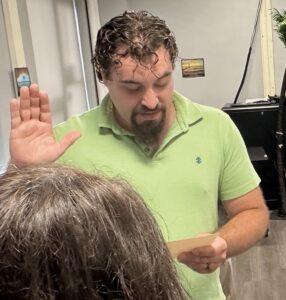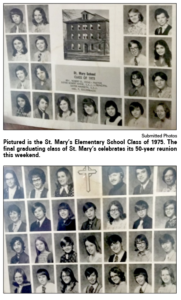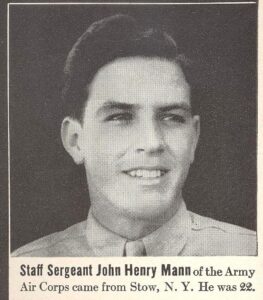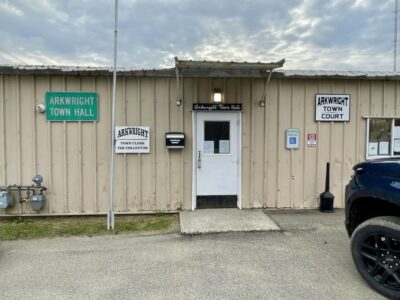Digging graves and rising above
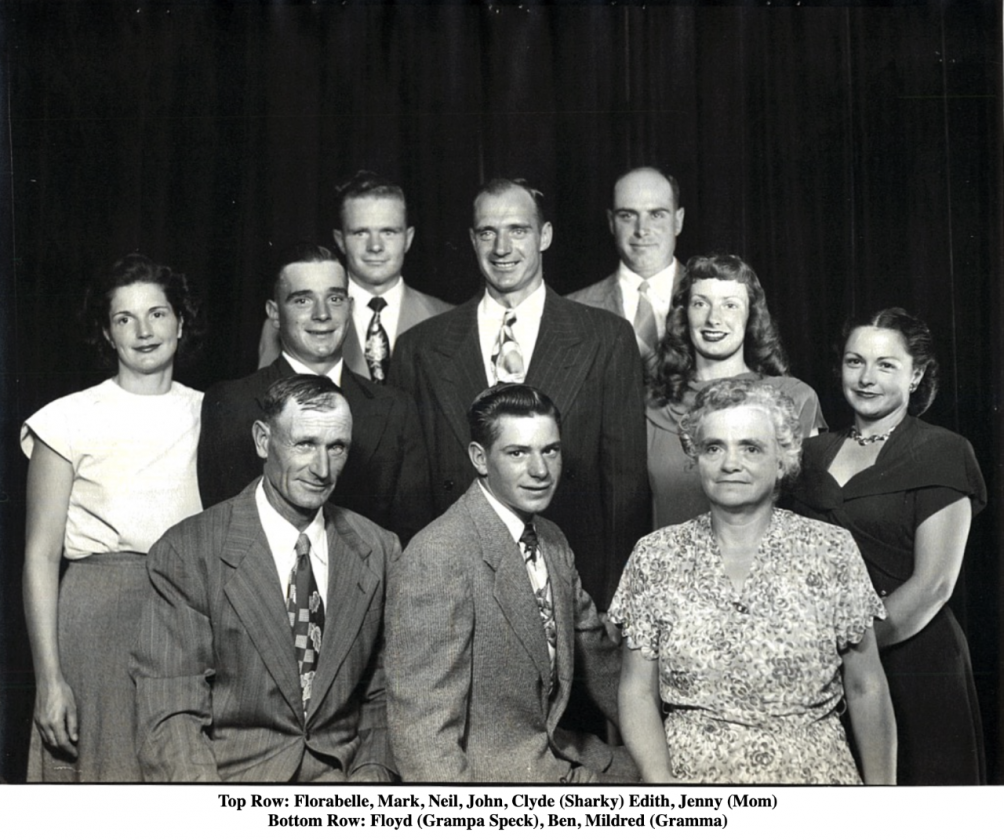
John Bradigan, in the middle of this photo, is the writer’s father.
I spent six years digging graves, then another another six in the military before I set foot in a college classroom. I never felt like I missed much.
It used to be a source of shame that I performed such lowly labors. Now I talk about it every chance I get. With Memorial Day around the corner, it seems as a good excuse as any.
My brothers and I had different recollections of our many hours spent digging graves. They remember our dad paying them $5 or so for their labors, usually three to four hours to dig a grave that was 7 feet long by 4 feet wide and 54 inches deep (the old saw about 6 feet deep is rooted in myth, anything deeper than the 4.5 feet is totally unnecessary).
I never, or at least rarely, got paid; my dad must have realized that it was foolish to bribe his sons. He was already providing them board and keep, what did they need the money for anyway? In my case, I think he thought I’d buy drugs with it. He was probably right.
Were I to have inherited the gravedigger job from my father, I would have told myself a narrative that it was all hard, honest work. We all die. How few of us get to bury others? To complete that cycle of life in such a concrete way? Chances are very good, if you are from Forestville or nearby, that either I, my brothers or more likely my father, buried one of your ancestors. I hope you know, if so, that their gravedigger took a moment to reflect on their mortal remains. Alas, poor Yorick indeed. One final act of service, impeccably performed.
In November 1963, a young New York Herald reporter named Jimmy Breslin, shut out of the scree and scrum of reporters in the mad wake of confusion of John F. Kennedy’s assassination, found another way into the story, one that didn’t depend on “access journalism” of inside government sources cultivated over decades. He saw a grim, determined man named Clifton Pollard at Arlington National Cemetery, working with a spade and backhoe, and interviewed him instead. Look it up, “Jimmy Breslin’s Gravedigger Story.” Pollard said of the sad duty, “It’s an honor.” I know what he meant. It’s a classic feature that echoes through the years, while the breathless reports of JFK’s tragedy from the veteran reporters, the Beltway insiders with quotes from bureaucrats and campaign organizers, will be long forgotten, the next day’s birdcage liner and fish wrap.
Gravedigging is hard, sweaty work. Toil in a biblical sense. The ceaseless shoveling. First with the sharp-edged spade around the edges of the red-painted wood template with the angle irons. Then rolling up the sod and placing those lumpy coils in a cool shady spot, then covering them with a damp shade cloth. Another half hour or more of hard work of shoveling away the top soil, which went either into our tractor’s trailer, or into a wheelbarrow where it was unceremoniously dumped over the edge of the cemetery into the raspberry bushes in the upper cemetery, or into the hardwood forest in Forestville’s lower cemetery.
That was just to clear the way for the backhoe, with its toothy bucket, to claw the final three or four feet of soil.
Even then when the operator finished you’d have to take the shovel and spade to square away the corners, to make it neat and tidy and respectable. A shoddy, shortcut job would bring dishonor.
My dad told me he split his fee — $150 in 1970s money — with the backhoe operator, who would be making about 25 times as much if you account for the time involved. It pays to have the right tools. However, in many gravesites, too steeply pitched on a hillside, or hemmed in with trees, we would have to dig the entire grave by hand. Sometimes, even during snowstorms, we would pick-ax our way through the frozen soil, like convicts breaking down rocks on the chain gang.
The lower cemetery was the ancient one; full of limestone markers with barely legible wording, Revolutionary war veterans among them. It was dark and brooding; it took 200 years for the hardwood forests to reach their climax state, to return to the conditions of an old-growth forest. The land was likely among the last cleared; these settlers, mostly from New England, went about their business at an astonishing pace; but next thing on their list was a cemetery. It made no sense to clear the entire space, so with their famous Yankee thrift, cut down the trees for lumber. By the time I came along, the forest had returned near to its maturity; thick-trunked maples, oaks, birch and beech with bark deeply corrugated. The shade and shadow were welcome when you were exerting yourself.
The upper cemetery, situated on a hillside, both equidistant from Forestville’s town center, had a grove of maples along its uphill side; but the plantings on its bottom half were relatively new. That meant being exposed in the sun for long periods of time.
But I learned more working in cemeteries than any classroom; it was where the human condition was laid bare. Ashes to ashes. I learned that princes and paupers share fate, that an honest day’s work is worth something for your character, to endure unpleasantness and pain and boredom. Because life will do that. Better to learn those lessons while young.
Also that there’s an impeccable state of mind within reach, to perform one final act of service for someone’s mortal remains, to honor them and all humanity. To feel the succession of generations, of birth and life all flowing through your labor.
It was far from boring. There’s a quality to hard labor that frees your mind. I’m hardly the first to say so. Viktor Frankl, (“Man’s Search for Meaning,”) said it best. Unlike the concentration camp victims he wrote about, I have had the eminent privilege of being well fed. Hence this whole food-related memoir project. My resolve to make something of myself was forged in that sweat and heat and discomfort. It wasn’t quite the “why” that made Frankl’s “any how” possible, but it was a handy stand in.
Every Memorial Day eve before the next day’s big parade, my dad and I would place flags on the headstones of all military vets. The headstones were where I practiced my math — born in 1797, died in 1851? That’s either 54 or 53. Date of death? April 4. Born? July 15th. Well, 53 then.
There were a lot of flags to place. My brother Bob and his grandson Brayden carry on this tradition to this day. Both cemeteries held the remains of many veterans. The Civil War especially. Some of those Civil War vets lived on until my dad’s time.
His butcher-owner friend at the stopover market on his mail route in Smith Mills, where we’d come in for gas and a frosty root beer, was the son of a Civil War veteran. The only conversation I can remember was about the Battle of the Crater, his father’s excitement when the plan was announced; a perfect stealth operation after weeks of digging and placing barrels of gunpowder under the fort walls, then the dismay and terror when they realized, as the soldiers streamed out into the breech, that they were sitting ducks, that the Rebs had recovered quickly after the initial explosion and regrouped around the crater’s edge, shooting everything that moved like tin ducks in an arcade game.
When I was a kid, the worst thing you could say about someone was that “they’re lazy.” Fighting words. Everyone, it seemed, prided themselves on working hard. On being a hard worker.
It’s been said “hard work never killed anyone.” I know that to be a lie. It kills people all the time. It killed my father at age 60. With a little luck, he could have lived another 20 years and got to know his grandchildren (he did get to know two — my nieces Karen and Jerimarie — but they were infants and have no memories of him behind the faded polaroids in their mothers’ scrapbooks.)
Dad’s sinewy forearms were the surest sign of his labors; you could see why this man, coiled and tight at 6 feet and 170 pounds, was able to muscle baseballs out of the park, stroking for power from both sides of the plate. It was the repetitive motions of shoveling and pick-axing as well as the trundling wheelbarrow loads of dirt and brush through the muck and dust of the wet and dry days. One thing I learned is that no matter how cold you felt, a few minutes of hard work would cure that until you were sweating furiously on the coldest days. That was the danger; that sweat would freeze in the subzero temperatures and then the wind would blow the heat from your body like a rapidly draining battery.
On that warm, sunny June day in 1980, Dad first felt the typical heart attack signs; weakness in his left arm, a clenching tightness in his chest and nausea. Since I myself suffered a heart attack at age 50, I know what to look for; every time I have indigestion, dread creeps into my thoughts. “Again? Is this it? Well, I’ve had a good life, I hope there’s not too much pain and suffering on the way out.”
He was halfway through his mail route when symptoms first emerged; he insisted on finishing the route before finally checking himself into the hospital. By that time, it was too far along to do much about it except wait it out. With today’s technology, he’d have had a powerful clot-busting drug, then they would have stuck a catheter up his artery from his groin and up into the site of the blockage and placed a stent. He’d be back on his mail route within a week.
As it was he lasted through the weekend, complaining to the nurses that he was late finishing his plantings in the garden. My brother Bob was close by, and he was told that it was a waiting game, not to worry, just go home and thoughts and prayers. Had he to do it again, he’d insist on a bypass surgery. The attending physician was way too young and way over his head.
At the time I got word, I was partying at the Airmen’s Club at Lowry Air Force Base, a 19-year-old who carried his mantle of near-virginity like an ox carries his yoke. My First Sergeant, Lanny McAndrew, in whose office I was the orderly room clerk, keeping track of the movement of paper at 3415 Combat Support Group, told me that my father had suffered a heart attack, he seemed to be recovering fine, they’d know more in the morning. I went to sleep thinking everything was just as he said, but that my future was forever after altered. My uncle Neal had passed away at age 55 just a couple years prior, dropping dead on his living room floor in the wee hours of the morning. Family lore also told of a great uncle, a talented baseball catcher, dying at age 35 and leaving behind 8 children. The fingers of spreading dread were already lurking in the recesses of my mind.
There’s an Oedipal moment in many men’s lives, when their fathers die and they step into the fullness of manhood like a brand-new suit. That never happened for me. In our one physical altercation when I was 16, I backed down out of fear and never fought it out with him. That meant in the Bradigan school of masculinity I was unworthy of assuming the full mantle of manhood. It’s a feeling hard to shake even now as I passed him in age. When my brothers Bruce and Bob joined me on my “Ojai: Talk of the Town” podcast, we all shared similar thoughts.
He lived a hard life and was afraid any sign of softness was weakness. He certainly didn’t want the world to chew up his boys and spit them back out. He was doing what he felt the circumstances called for. I loved him and miss him every day. I would never hope for more from my own son.
Bret Bradigan is the editor and publisher of the Ojai Quarterly & Ojai Monthly in California. He also produces a weekly podcast, “Ojai: Talk of the Town.”

